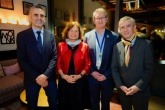WRAP EU convenes Brussels talks on textiles EPR implementation
NGO’s European arm holds event with EU officials to encourage circular economy policies focussed on fashion sustainability and food waste reduction.

The meeting brought together European Commission officials, business executives, and NGOs to discuss upcoming regulations affecting food waste reduction and textiles extended producer responsibility (EPR).
The event introduced WRAP's expansion into European policy development through WRAP EU, an organisation launched in January in partnership with the International Food Waste Coalition (IFWC). Catherine David, WRAP's new CEO, used the Brussels gathering to outline the scale of regulatory change facing European businesses.
"Europe is about to undergo unprecedented change. The incoming textiles EPR will touch every member from Copenhagen to Milan and change how countries make and manage clothes for good," said David. "The EU is also committed to halving per capita food waste and reducing food losses in production and supply chains."
The discussions focused on practical implementation of policies that will affect sectors accounting for 45 per cent of worldwide greenhouse gas emissions, particularly food, textiles, and manufactured products.
Textiles EPR implementation challenges
The Brussels talks addressed growing concerns about textiles collection infrastructure across Europe. Countries have been mandated to collect used textiles from January 2025, but delays to the final voting on the revised Waste Framework Directive have left many without effective processing systems.
WRAP EU shared its analysis of different EPR policies across Europe, drawing on experience from plastics schemes and its work with the Irish government on textiles EPR development. The organisation highlighted the gap between collection mandates and infrastructure capacity as a critical challenge for member states.
Sofie Schop, WRAP EU's incoming Executive Director, will lead efforts to support government and business implementation of the new regulations. Schop brings over 20 years of sustainability experience across fashion brands including Tommy Hilfiger, G-STAR RAW, and Karl Lagerfeld.
"There are big changes ahead and I can't wait to help bring these into practice," said Schop. "These powerful changes happen through collaboration and shared ambitions; they benefit business but most importantly they help take the heat out of climate change."
Targeting food waste reduction
Klaus Berend, Director for Food Safety, Sustainability and Innovation at the European Commission's Directorate-General for Health and Food Safety, delivered a keynote speech on binding food waste reduction targets. The Commission has set ambitious goals for halving per capita food waste across member states.
"The forthcoming binding food waste reduction targets are ambitious but can be reached - if we act without delay, build on what we know works, and ensure all actors play their part," said Berend. "This is not only about achieving legal obligations. It is about creating a more sustainable, efficient, and fair consumption and production system."
WRAP EU highlighted existing progress through the IFWC, which has already delivered significant reductions in the European food service sector. The IFWC has achieved a 27 per cent reduction in food waste in food service and a 36 per cent reduction in hospitality, representing a €200 million annual saving against its 50 per cent target.
WRAP’s European expansion strategy
WRAP EU represents a strategic expansion of the UK-based organisation's influence into European policy development. The new entity will focus on transforming food systems and addressing unsustainable production in fashion, textiles, and plastics across EU member states.
The organisation's 20-year track record in food loss and waste reduction has been expanded into a global Food Pact Network, providing experience for supporting European implementation of circular economy policies.
David emphasised the global significance of European regulatory leadership: "Its Waste Framework Directive is world-leading in ambition for transformative collaborative action, underscored by its long track record of sustainable leadership. Driving Circular Living models on this scale will have a profound impact on global actions to cut greenhouse gas emissions."
Industry participants at the Brussels event included Laura Lourdelle, Resource Efficiency Lead at Sodexo, Paul Kerssens, Co-Founder & COO of United Repair Centre, and Stéphane Leroux, Executive Director of IFWC.
Lourdelle welcomed WRAP EU's policy focus: "The launch of WRAP EU is a vital step in advancing Europe's circular economy ambitions. Market maker in sustainability, Sodexo is proud to be part of this movement and looks forward to shaping the next chapter together."








